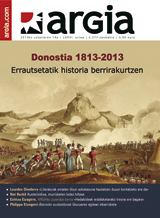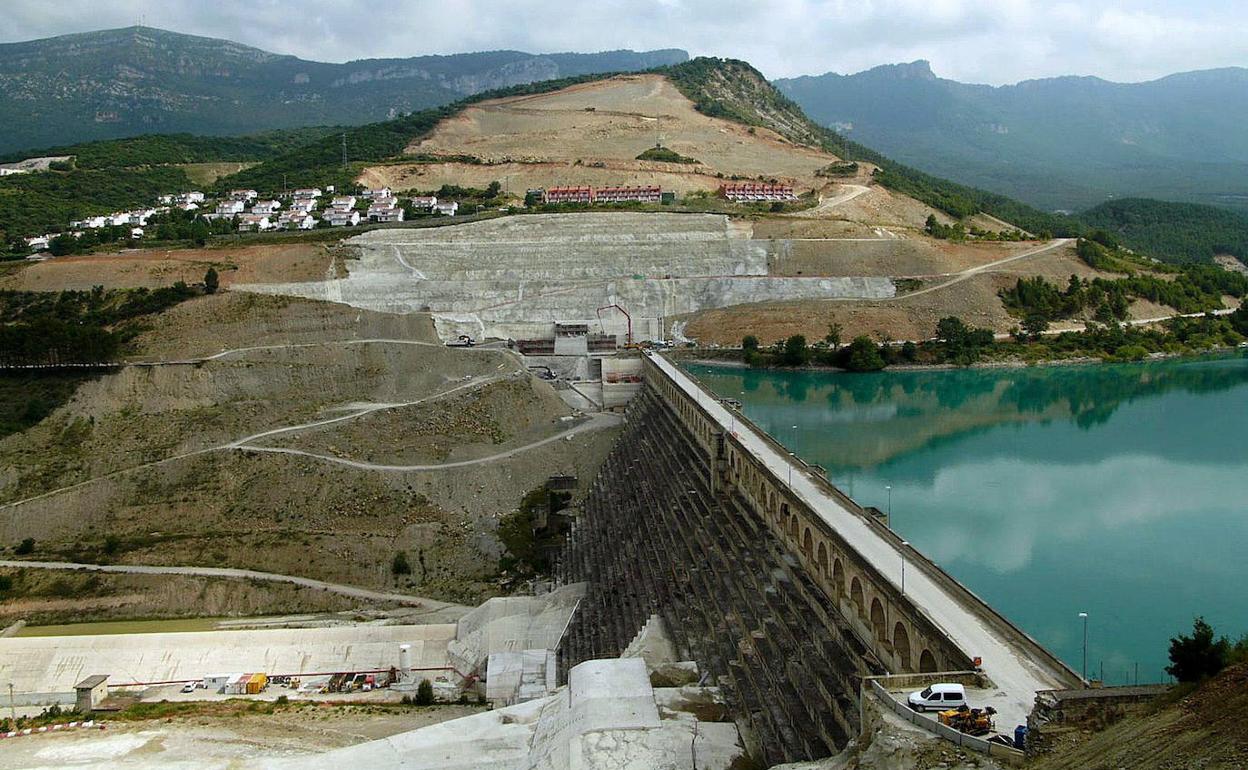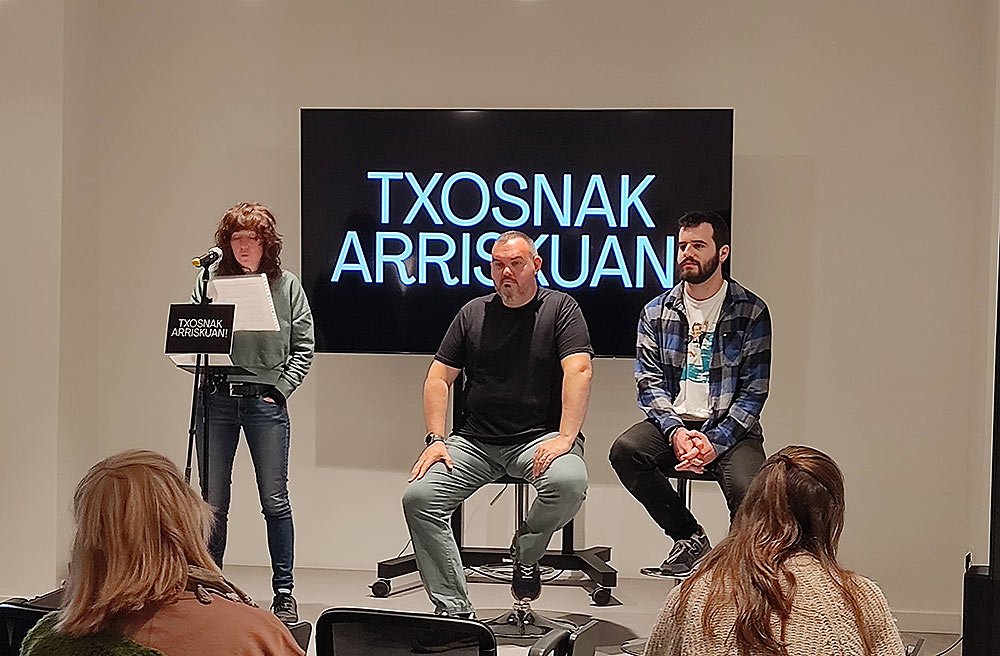"Let's empty the word conflict."
- San Sebastian (1958). She's Euskaltzaina and linguist. Professor at the UPV/EHU. Its preferred theme is phonology. He's also a writer. In the spring he published the novel Erein. Time lives responsibly. She and Luzia, protagonists of the novel. Luzia is also a linguist and is dedicated to phonology. Victor and Eva are other main characters in the novel: Eva lost her voice – and her parents – in an attack. He's got aphasia. Lucia goes around the world, Lourdes as well. His first contact with Lourdes Oñederra was with Vienna. He then went to Leiden (Netherlands). We left the day of the solstice, in the Tolare dwarf of Donostia-San Sebastián, in the headquarters of Euskaltzaindia.

Fourteen years have passed and the woman the snake told her! since the publication of his first novel. He won the Euskadi and La Critica awards. Time is the fundamental theme of Lourdes Oñederra. It seemed to me that the criticism of the second novel, and the reception, is nothing but digestion. Moreover, we ended the conversation without having done more than help me digest, if I have led it down the path of digression.
Luzia, the protagonist, has been discovered on the cover of Intemperies (in search of refuge), where it is accompanied by the faithful boxer Taka. He was the dog of Lourdes's brother. He has greatly praised his friendly dog. Among other things, it's a love novel. We have referred to “kisses”. In the whirlwind of time, we have begun the conversation about the difference that has been made in the relations between men and women: “As I entered Euskaltzaindia, I realized that the president of Euskaltzaindia usually kisses the woman, hands the man. I told the president of Euskaltzaindia [Andrés Urrutia] that if you don't kiss Joan Mari Torrealdai, you don't kiss me either. Why that gender difference?” Well, between friends, as you want, but in the protocols, why that difference?”
The theme of the novel is the relationship between men and women.
I would say it's between people, there's a difference between men and women. One of the axes of the novel is that of the networks of relations between men and women.
The woman is seeking refuge...
We are all in Intemperies or seeking refuge; not at all times. In other words, we seek opportunities that wake us up. We're looking for refuge, but we're disguised, as if we're not on a trip. We want to start on something else, and each variant puts us in question, in a new situation. We're going through inertia, and when something new happens, cracks appear in some way.
“Time passes differently.” This is the first sentence of the book. The first sentence seems to indicate the meaning of the book.
Well, it's an old phrase, because I have a lot of time to write. However, we made a change of house, and I remember the room I was in, I accurately remember the phrase. You're right. Anyway, you have an idea, but when the idea comes to you with words, that's what gives you the fate. When I came up with this idea, I didn't know where the novel was headed. The first part is not like everyone else. I ended the book by linking the first and last paragraphs. The time difference fascinates me a lot. That's happened to me from a young age, it's very eye-catching. The adults said “time goes faster and faster” and we said “they’re not right in the head.” The older people said, in our view, a lot of nonsense. Damn it! After fifty years, the awareness of time changes. The imprint that leaves time in life seems to me curious and interesting.
And at the beginning of the novel that the snake told the woman, you kind of mentioned it.
Well -- I didn't do it on purpose. The truth is, I don't have the innocence before. “Critics are going to catch that,” I thought. So, as an evil child, I made a kind of game. Without analyzing it too much, I hadn't thought of going to look for that image of the Bible. When you write, sometimes you put yourself in the path of dreams, at another level, and things appear there. Paradise and the snake again -- I thought. Well, you don't know exactly why.
“That being like God was desirable,” the narrator thinks.
Yes, it is a stimulating issue. Can you want what you don't know? No. But they, symbolically the first, Adam and Eve... Desire and envy are things that man cannot bear. Wanting like others, wanting or needing to control the lives of others. That takes us out of freedom. Envy is one of our chains. But it's also a motor. Anyway, I fell into the trap, I'm analyzing the book with you, this way, as I got there.
The Westerners have a difficult problem to adjust the time. We have money, the neighbours of other countries have time. Time management is our primary task. The novel has suggested this opinion to me.
In the post of the last chapter I have made a quote from the singer Fabrizio de André. Your voice is magical to me, I'm also interested in some lyrics of your songs. It says time passes, but time itself is not in a hurry. That’s my wish, “Don’t try to run, don’t stop, but don’t get slimmed down on time.” Then, what we don't have time and we have money, is a topic. They don't have any money or time. I've been to a school in Guatemala four times in recent years. They are essentially annoyed everywhere, and with that we want to justify our own.
Luzia is a linguist, she's not a mother. Poor Lourdes! Who is Luzia for Lourdes?
A character that comes from far away, from before writing the first novel. The length has many of my characteristics, but it's superficial. In these autobiography issues, there's a lot of morbid. Around the characters in the previous novel, I had phone calls. “I know who you mean, I’ve felt it like smoking cigarettes.” “Well, look, what you mention doesn’t smoke,” I. “Don’t say!” Once again: “I know a part of that story,” I heard. “Ah yes...” And I said to you, “Do you think you know that lover? Do you think I had one? Or do you know all my lovers?” “So isn’t that?” he replied. It's good to meet the reader. It's also a literature game, the reader's game is nice. But there are things from literary critics that you're ashamed of.
Is literature sometimes a desolate game?
No, no... That loss of innocence has its good side. But since Lucia has my job, perhaps I should call him Lourdes or Lou and write him free. That is, with the character happens to you that at first it is far from you, it is invented or more invented. Then you approach him, you give him occupation, place of birth, that and others. The character approaches and moves away. I have the feeling that he is someone I have met, who has been around for fourteen years. It gives me a kind of sadness to let go of her adventures.
However, the suggestions irritate you.
I dislike where they come from, like other things in life. It's like throwing losintxas or flowers. Where do they come from, no? When they come from a power point, from those false sages, from those who criticize ... Someone who is in the literature should know if the literature is materialized differently. Readers seem to me to be one of the most interesting aspects of writing. You do one part of the literature and the other is the reader. There's a lot of readings, and readers are given things that don't go through their heads. That's what I do a lot. So it's hard to say that I mean this or that with this book. I do not know what can be stopped behind the perspectives opened up by history – in the reader. I don't like to explain them.
How does the fact of being a linguist influence your writing, as a writer?
It has good and bad influence. In me, it's very present, because I'm a vocational linguist. It influences, for example, because I am aware of many aspects of languages. I'm interested in languages, not the only language. I also work on the aspects of the language from the lungs to the nose and to the mouth. Humans do different things with language, I study them a lot. I am also concerned about this moment in the Basque country: the Basque is better sociologically than ever – at least in some places – but linguistically, I do not know if he is so strong. It seems to me that it is important to know which language is used and how it is used.
So does it use simple language records?
I wrote the first novel for the reader to pick it up without the dictionary. I do not have a specific answer now. Perhaps the influence of that consciousness is present in the novel. That's what has driven me to write that way, but I don't know to what extent it's free. Some Basque novels don't give me the taste of literature, but I learned a lot from Euskera. I have the Basque slightly poor, the street. So my zeal was this: “You must forget the linguist, don’t write programmatically.” So I notice when I write free, both because of the subject and because of the language. You mentioned the initial phrase earlier: if you have an idea, but if you do not roll well, the phrase does not work. You realize when you get it and when you don't. Sometimes I think I have succeeded.
He has also written about the “Basque conflict”, in a simple way but with a special aesthetic.
Perhaps it is one of the most important issues in the novel, not much has been mentioned. Novels are often said to be biography. Increasingly within and more intricate, further away from rational consciousness or linguistic form, the issue is deeper. Psychotherapists know how important it is to mention things, you can be several years without mentioning them, but when you mention them... My biggest impression in the history of this people is to see myself, in a way a conflicting relationship with myself. In fact, the situation we are experiencing now with the end of ETA, which has gone so long, and I stress this: “Where have I been?” And I know where I've been in some things. I went to see students in prison, I moved when Josu Muguruza was killed. I'm critical of ETA ... But I have not seen the other party, that of the victims of ETA ...
Do you mean you've seen late?
It's always late. And ETA was born with me or I with him. Hannah Arendt is now for sale. How did the Germans make that hole in consciousness? I've done that. Obviously, changing shapes and sizes. I hear it now, and I am afraid of the future of this country. If you cover things up ... I'm in that mess, very overwhelmed. One of my favorite subjects is phonology. “How we hear what we want to hear.” How you see some things and others don't. It was one of those you saw. I remember when we were younger. Now I see how many jobs we have to get a collective echo. I have not gone into the matter further, it is not an attempt, because I have no opinion. And in a way, this is because I've lived it that way. You have grasped that.
The linguist Luzia works with Eva, who has aphasia. Somehow you've worked oblivion.
I didn't make that connection, I didn't have it in my head. I therefore see that and I welcome it. Aphasia itself gets very interesting to me, maybe it's the first topic I had in my head, the subject I was talking about. If you knew how many hours I have spent reading papers on aphasia. Then, the freedom that literature gives you is the way you tell it. There are many kinds of aphasia, but I wanted you to say almost nothing about aphasia.
How should one write about the memory of the conflict in literature?
You can do fiction with what you can, but I can't write programmatically. You say conflict, for to begin with, let us take away the word conflict. We should play for a few months. In other words, I would be forced to move on to the attempt to express something about the conflict. There's conflict, and to start with, we have conflict with ourselves. In the novel I cannot delve into it. The word conflict does not seem appropriate to me, because the conflict itself has thrown the word out. I find this idea interesting, it's not mine. We are going to empty the word conflict. It will put us in the next lesson.
BRN + Neighborhood and Sain Mountain + Odei + Monsieur le crepe and Muxker
What: The harvest party.
When: May 2nd.
In which: In the Bilborock Room.
---------------------------------------------------------
The seeds sown need water, light and time to germinate. Nature has... [+]























